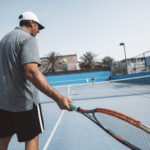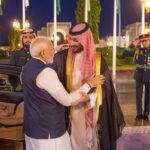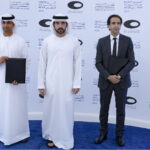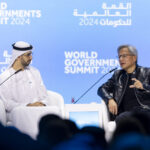Can Lucid jump-start the electric vehicle industry in Saudi Arabia?
Though fewer than 1% of cars on the road are electric, the kingdom is setting an ambitious target for 2030 of 30% as it tries to shift the economy from oil

AMER HILABI/AFP via Getty Images
A Lucid Motors electric vehicle shown at the KSA Green Transition Journey exhibition in Jeddah. (Photo: Getty Images)
Saudi Arabia’s push to develop an electric vehicle industry took a step forward last week when California-based Lucid Motors opened the kingdom’s first automobile factory.
With initial plans to assemble 5,000 EVs a year at its new plant outside the western port city of Jeddah, Lucid expects to boost that number to 155,000, underlining Saudi Arabia’s ambition to become a significant manufacturer. It would be a major leap as much for the country as for the luxury carmaker, which produced 7,180 vehicles last year at its sole factory in Casa Grande, Ariz., hampered by supply chain issues and recalls. By comparison, Elon Musk’s Tesla sent almost 1.4 million cars off its assembly lines in the U.S., Germany and China last year.
Riyadh is looking to supply the domestic market but also to transform the kingdom into a regional car hub as it diversifies its economy beyond oil revenue – and it’s looking beyond Lucid to meet its aims.
While the kingdom’s Public Investment Fund has put a total of $5.4 billion into the loss-making Lucid to become its largest shareholder, the government has also signed a $5.6 billion deal with China’s Human Horizons to develop and manufacture EVs. Meanwhile, major players from Hyundai to Peugeot have already said they see a road to Middle East manufacturing and sales of EVs running through Saudi Arabia.
Market research firm Mordor Intelligence valued the EV market in the Middle East and Africa at $2.7 billion this year, dominated by Tesla, Volkswagen, BMW, Nissan and Hyundai but estimates it will grow to $7.65 billion by 2028.
The kingdom is eyeing the domestic development of EV parts both for home and export as well. PIF, Saudi Arabia’s sovereign wealth fund, and Taiwanese manufacturing giant Foxconn founded the Saudi electric car company Ceer Motors in 2022 and the pair is in talks to build a $9 billion plant to manufacture microchips and electric-vehicle components.
While the new Lucid plant will see workers reassemble premade American-designed and built “kits,”, the kingdom is planning to domestically design and manufacture EVs as part of its Vision 2030 reform program to shake up almost every sector of the society and economy over the next seven years under Crown Prince Mohammed bin Salman.
“As Saudi charges toward its Vision 2030, our facility will pave the way for the country’s electric automotive industry and the expansion of the supply chain, and with the support of the Saudi Government, we are proud to drive local talent development in the technology industry,” Peter Rawlinson, CEO and chief technology officer of Lucid Group, said at the opening of the plant in Jeddah on Wednesday. “We look forward to delivering Saudi-assembled cars to customers in Saudi Arabia and beyond.”
But Saudi Arabia will face strong global competition in EV manufacturing and regional challenges from long-established car industries in Morocco and Turkey; the latter says its membership in the EU Customs Union gives it a strong advantage.
While the kingdom plans on 30% of car sales to be EVs by 2030, it may face consumer hesitation. Gasoline is subsidized at $2.35 a gallon this month – compared to an average $3.85 in the U.S. – and less than 1% of passenger car sales are currently electric.
Another major speed bump is a lack of charging infrastructure as well as maintenance and specialized technical knowledge.
However, the government launched the Saudi Electrical Vehicle Charging Infrastructure Development Initiative in 2021 with the target of 50,000 charging stations across the nation by 2025.
A poll by General Motors and Morningstar in June 2023 found that 63% of Saudi respondents were “strongly considering” a future EV purchase but only 1 in 5 said that they knew of a charging point in a convenient location for home or work.
The same poll found that knowledge of EVs in the kingdom was already very high, no doubt boosted by some of the kingdom’s flagship projects like the NEOM McLaren Electric Racing team competing in the Formula E championships as well as the off-road all-electric Extreme E race.
While the kingdom is aiming for net zero by 2060, most respondents to the survey said that it was the cost of fuel, potential savings and the improvement in available EV options that was driving them to look at buying an electric car.










